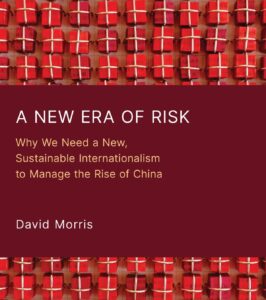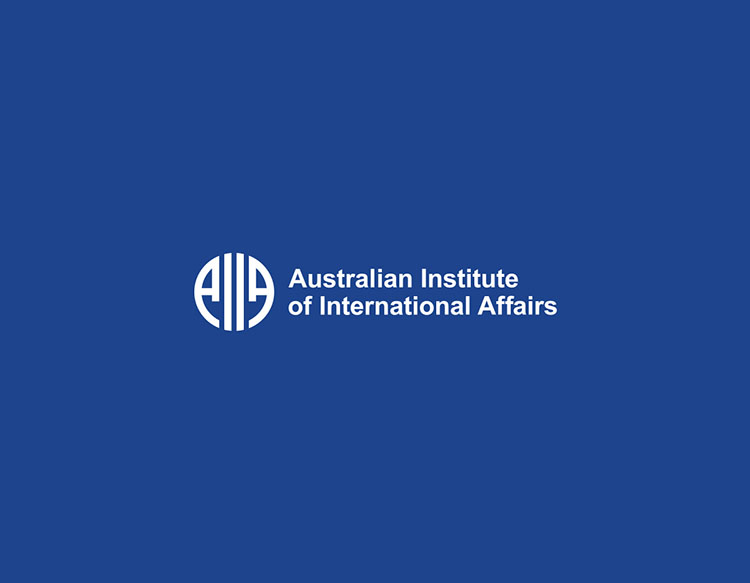On 15 July 2025, the Australian Institute of International Affairs NSW welcomed Dr David Morris, CEO of the Australia China Business Council (Tas), to Glover Cottages to launch his new book A New Era of Risk: Why We Need a New, Sustainable Internationalism to Manage the Rise of China.

Dr Morris began by observing that China’s rise and growing influence on international politics has shifted the world order towards multipolarity. For the first time in decades, a non-Western power is challenging the hegemonic dominance of the Western liberal democracies of Europe and the United States. Dr Morris discussed how China’s rise has prompted fearmongering from Western nations. He cited exaggerated media narratives that Chinese technology is used for spying, for examples in unfounded reports that Chinese port development projects in the Pacific are covert military bases.
Dr Morris then explained why so many in the West are resistant to China. He first noted that the rise of a new power has caused the West an identity crisis. The United States sees itself as the ‘glue’ of the world, resolving disputes and setting global agendas. China threatens that global leadership. Secondly, the West has had poor historical experiences with multipolarity. Europe, Dr Morris acknowledged, was marred by conflict and instability. Thirdly, he explained that China’s rise seems foreign and unfamiliar because the United States and Europe do not understand and are not exposed to China, or Asia more broadly. Finally, the success of China despite its illiberal governance undercuts the persuasiveness of Western liberalism across the globe.
Dr Morris contrasted these Western perspectives to other experiences of multipolarity. He noted that for many Asian nations, like Kazakhstan or countries in South-East Asia, multipolarity is welcome as they have had poor experiences with being dominated by singular powers.
Dr Morris cautioned against catastrophising China’s rise. Instead, he provided a host of reasons why it is more sustainable and more in line with Australia’s interests to embrace China pragmatically. First, collaboration enables Australia to maintain our trade relationships and incentivise compliance with free trade agreements. Secondly, Australia and the world must take active steps to combat climate change. This includes pursuing relationships with countries succeeding in this field. China has a plan to tackle climate issues, as its electric vehicles and renewable energy investments demonstrate. By contrast, traditional allies like the United States are backsliding in their green transition. Finally, he argued that adapting to multipolarity is more sustainable than resisting the rise of Asian economies.
Dr Morris assessed that Australia is well-placed to embrace the rise of China. Australians are familiar with multiculturalism and comfortable with diversity. Moreover, Australia has long prospered through our trade with China, and can recognise what we can gain from its rise.
Dr Morris argued that we must reject the binary idea that we can only either collaborate or conflict with China. Our leaders should consider the full range of Australia’s interests in deciding where we draw the line with China and how best to enrich Australia through relations with China. Rather than capitulating to fearmongering, Australian leaders must exercise agency, openness and optimism about the rise of China to ensure a more sustainable foreign policy.
Questions from the audience sought clarification on the shift to multipolarity. One audience member asked whether the non-Western BRICS countries aim to operate outside of Western institutions. Dr Morris agreed, noting that the success of BRICS demonstrates that Western organisations like United Nations and the World Trade Organisations have in many ways failed, and need structural reform. The United States has increasingly distanced itself from these organisations, reducing their effectiveness. The rise of BRICS and parallel institutions signals a shift from Western hegemony towards multipolarity.
This led another audience member to ask how sure Dr Morris was that Asian economies were going to be dominant in 25 years. Dr Morris said that nobody can be completely certain. While authoritarian regimes expose their nations to problems that can interfere with their growth, democratic regimes experience problems as well. The countries that are predicted to rise fastest in the next 25 years are China, Japan, India, and Indonesia.
A participant wondered whether globalisation is on the decline. While acknowledging that many in the West are opposed to open markets and China is growing more self-reliant, Dr Morris considered that globalisation is more likely to continue and that Australia will profit from its development.
Audience members expressed concern about the best way for Australia to pursue relations with China. One member asked whether pursuing closer relations would be inconsistent with Australasia’s Western liberal alignment. Dr Morris suggested that it is not hypocritical to deal productively with diverse societies. He emphasised that Australia is – irreversibly – in the Asian region, and needs to be involved in its politics. Responding to a comment that former prime ministers sometimes struggled to sustain good relations with China, he noted that Australia has to pursue relations wherever it serves our national interests; China is a key strategic and economic power.
When queried about whether Australia really was that comfortable with China, given the recent press coverage of Prime Minister Albanese’s visit to Beijing, Dr Morris replied that our hegemonic media failed to acknowledge our comfort with Asia or how successfully Prime Minister Albanese and Minister for Foreign Affairs Penny Wong handled multipolarity.
An audience member suggested that closer association with China might jeopardise our relations with the United States. Dr Morris responded that Australia should learn to say no to the United States sometimes. The current volatility of the Trump administration makes saying no all the more reasonable.
Asked how he found writing during COVID-19 in Budapest, Dr Morris responded that he had had a lot of time and a unique perspective. Living in Budapest, far from Chinese influence and exposure, had allowed him to write more objectively. At the same time, he had been better placed to travel widely and collect a range of opinions on China and its relations with a range of other countries.
The discussion with Dr Morris left the audience with a more informed perspective on Australia pursuing its actual national interests with China, looking past the fearmongering in much discussion of China’s rise.
Report by Aman Mohamed, AIIA NSW intern


